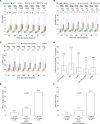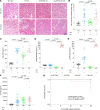suPAR links a dysregulated immune response to tissue inflammation and sepsis-induced acute kidney injury
- PMID: 37036003
- PMCID: PMC10132159
- DOI: 10.1172/jci.insight.165740
suPAR links a dysregulated immune response to tissue inflammation and sepsis-induced acute kidney injury
Abstract
Acute kidney injury (AKI) secondary to sepsis results in poor outcomes and conventional kidney function indicators lack diagnostic value. Soluble urokinase plasminogen activator receptor (suPAR) is an innate immune-derived molecule implicated in inflammatory organ damage. We characterized the diagnostic ability of longitudinal serum suPAR levels to discriminate severity and course of sepsis-induced AKI (SI-AKI) in 200 critically ill patients meeting Sepsis-3 criteria. The pathophysiologic relevance of varying suPAR levels in SI-AKI was explored in a polymicrobial sepsis model in WT, (s)uPAR-knockout, and transgenic suPAR-overexpressing mice. At all time points studied, suPAR provided a robust classification of SI-AKI disease severity, with improved prediction of renal replacement therapy (RRT) and mortality compared with established kidney biomarkers. Patients with suPAR levels of greater than 12.7 ng/mL were at highest risk for RRT or death, with an adjusted odds ratio of 7.48 (95% CI, 3.00-18.63). suPAR deficiency protected mice against SI-AKI. suPAR-overexpressing mice exhibited greater kidney damage and poorer survival through inflamed kidneys, accompanied by local upregulation of potent chemoattractants and pronounced kidney T cell infiltration. Hence, suPAR allows for an innate immune-derived and kidney function-independent staging of SI-AKI and offers improved longitudinal risk stratification. suPAR promotes T cell-based kidney inflammation, while suPAR deficiency improves SI-AKI.
Keywords: Clinical practice; Diagnostics; Inflammation; Nephrology; T cells.
Conflict of interest statement
Figures




References
-
- Kellum JA, Prowle JR. Paradigms of acute kidney injury in the intensive care setting. Nat Rev Nephrol. 2018;307(4):2265–2230. - PubMed
-
- Kellum JA, et al. Kidney disease: improving global outcomes (KDIGO) acute kidney injury work group. KDIGO clinical practice guideline for acute kidney injury. Kidney Int. 2012;138:1–138.
Publication types
MeSH terms
Substances
Grants and funding
LinkOut - more resources
Full Text Sources
Medical
Molecular Biology Databases

